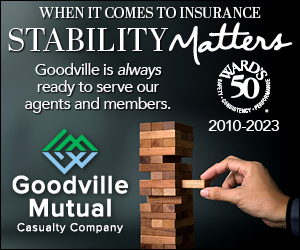SCC Bureau of Insurance Encourages Businesses to Plan Now for Natural Disasters
Print this Article | Send to Colleague
Hurricanes and other natural disasters can take an immense toll on businesses including closures or disruptions that may last for days, weeks or longer. Some businesses may never reopen following a natural disaster, while others that reopen may fail soon after. No business is immune to the effects of natural disasters. Even disasters far away can impact your business by disrupting supply chains and communications.
The State Corporation Commission’s Bureau of Insurance (Bureau) encourages businesses to assess their risk of damage or disruptions from disasters, review their insurance coverage regularly, and adjust it as needed to make sure they have enough coverage to help return their business to operation. Businesses should understand what their policies cover and how much they may need to make repairs, minimize disruptions and pay business expenses – including payroll and payments to creditors – in the event of a disaster.
Contact your insurance agent or company now – before disaster strikes – if you have questions about coverage or filing a claim.
Advance planning is critical. “The survival of your business can depend largely upon how you plan for and respond to disasters,” said Virginia Insurance Commissioner Scott A. White. “Protect yourself and your business physically and financially by preparing for the unexpected and having the insurance coverage you need when you need it.”
The Bureau offers the following tips to help get your business running again as quickly as possible after a natural disaster:
- Assess your risk for certain types of disasters, such as fires or floods.
- Have emergency disaster and business continuity plans in place that include a communications plan, employee contact information, backup vendors or suppliers, a temporary relocation site and procedures for work processes and payroll.
- Make sure your insurance coverage is up to date by reviewing policies and adjusting as needed.
- Know how to respond if disaster strikes.
Educate yourself on what your insurance policies cover and consider the following:
- What are your deductibles, coverage limits and exclusions?
- Do you need additional or separate coverages such as coverage for damage related to floods or earthquakes, which are not usually covered by standard business insurance policies?
- Do you need separate automobile insurance for business vehicles?
- Are your business and its contents insured for current replacement cost?
- Will you need business interruption insurance to cover loss of income that your business may suffer after a disaster?
Additional steps businesses can take include the following:
- Share business continuity plans with employees and hold disaster simulation exercises.
- Develop a communication plan and procedures for work processes and payroll during a disaster or business interruption.
- Keep preparedness items onsite at your workplace – including disaster provisions, maps with evacuation routes and access to a working radio and mobile apps for emergency instructions.
- Compile and safely store an inventory of assets and equipment (including computer hardware), and back up all personal and company data regularly in case information is lost during a disaster.
- Keep physical copies of important records (such as building plans, insurance policies, bank accounts and employee contact information) in a safe, waterproof and fireproof place.
The Bureau offers free consumer guides specifically geared to businesses. To learn more, contact the Consumer Services Section of the Bureau of Insurance Property and Casualty Division toll-free at 1-877-310-6560 or in Richmond at 804-371-9185 or visit scc.virginia.gov/pages/insurance.
For additional emergency preparedness information relating to disasters, visit vaemergency.gov.



